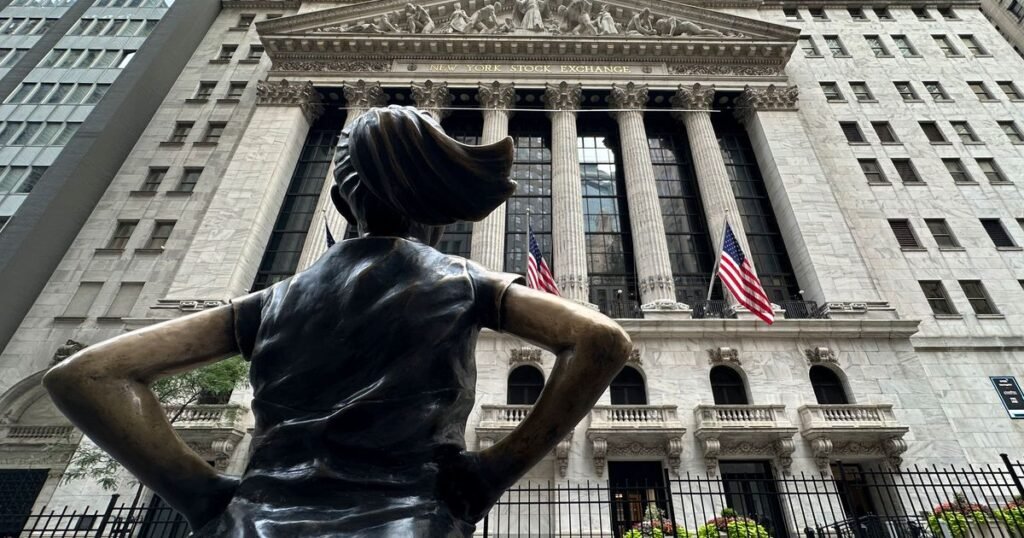BANGKOK (AP) — Stocks fell in most global markets on Thursday as a key U.S. inflation reading due Friday could provide a glimpse into the future of interest rates.
Hong Kong led the decline, dropping more than 2%. U.S. futures also fell, but oil prices rebounded.
In early European trading, Paris’ CAC 40 index was down 0.2% to 7,593.97, while London’s FTSE 100 index was down 0.1% to 8,215.80.
Germany’s DAX index was the only outlier, rising less than 0.1% to 18,162.74.
Futures for the S&P 500 and Dow Jones Industrial Average both fell 0.2%.
The biggest focus for markets this week will be the U.S. government’s inflation report on Friday. The personal consumption expenditures (PCE) index is the Federal Reserve’s preferred inflation gauge, and analysts said recent mixed data has investors on the sidelines.
The latest information on inflation could influence central banks’ decisions on when to start cutting interest rates, which are at their highest in more than two decades and have repercussions around the world.
In Asia, a new set of measures to revitalize China’s property market failed to boost sentiment. Hong Kong’s Hang Seng Index fell 2.1% to 17,716.47, while the Shanghai Composite Index fell 0.9% to 2,945.85.
Beijing became the latest city to cut minimum down payment requirements and mortgage interest rates starting Thursday to support the real estate sector.
Other Chinese cities are taking similar steps in line with national policies aimed at luring buyers back to a market that has slumped since the government cracked down on excessive borrowing by property developers, causing dozens of property companies to default on loans and dragging down the wider economy of the world’s second-largest economy.
In Tokyo, the Nikkei average fell 0.8 percent to 39,341.54 on concerns the yen would continue to weaken.
The U.S. dollar was trading at 160.52 yen early Thursday after breaking through the 160 yen level the previous day, its lowest since late 1986. Japanese government officials have warned they may intervene in the market to counter the trend, which could have both positive and negative effects on the economy.
Elsewhere in Asia, Australia’s S&P/ASX 200 fell 0.3 percent to 7,759.60. Taiwan’s Taiex lost 0.4 percent and Bangkok’s SET lost 0.5 percent. Shares in Mumbai, Jakarta and Singapore rose.
Wall Street stock indexes were close to the all-time highs they hit last week in largely slow trading on Wednesday.
The S&P 500 index rose 0.2%, but about 65% of the stocks that make up the benchmark index fell.
The Dow Jones Industrial Average finished up less than 0.1%, while the Nasdaq Composite Index rose 0.5%.
Several large-cap stocks helped offset the S&P 500’s overall decline.
Amazon.com rose 3.9%, surpassing $2 trillion in market capitalization for the first time. The company’s stock price gains came just days after Nvidia topped $3 trillion in market capitalization, briefly becoming Wall Street’s most valuable company.
FedEx Corp. rose 15.5% to offset losses after the package delivery company reported its latest quarterly results, which beat expectations. Rivian Co. surged 23.2% after Volkswagen said it would invest up to $5 billion in the struggling electric car maker.
Apple rose 2% and Microsoft added 0.3%. The large value of these stocks tends to have a big impact on market direction.
Investors are hoping the Federal Reserve will start cutting interest rates soon, but efforts to bring inflation back to its 2% target have been stumping, with Wall Street expecting a rate cut when the central bank meets in September.
The economy has held up relatively well despite high inflation and borrowing costs for consumers and businesses, but it is slowing, and Wall Street is hoping the Fed will time its rate cuts to ease pressures before the economy slows too much, but not to miss its goal of keeping inflation in check.
In other trading, benchmark U.S. crude rose 68 cents to $81.58 a barrel in electronic trading on the New York Mercantile Exchange, while the international standard Brent crude rose 72 cents to $85.19 a barrel.
The euro rose to $1.0696 from $1.0681.

